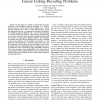Free Online Productivity Tools
i2Speak
i2Symbol
i2OCR
iTex2Img
iWeb2Print
iWeb2Shot
i2Type
iPdf2Split
iPdf2Merge
i2Bopomofo
i2Arabic
i2Style
i2Image
i2PDF
iLatex2Rtf
Sci2ools
158
click to vote
CORR
2011
Springer
2011
Springer
Information-Theoretic Viewpoints on Optimal Causal Coding-Decoding Problems
—In this paper we consider an interacting two-agent sequential decision-making problem consisting of a Markov source process, a causal encoder with feedback, and a causal decoder. Motivated by a desire to foster links between control and information theory, we augment the standard formulation by considering general alphabets and a cost function operating on current and previous symbols. Using dynamic programming, we provide a structural result whereby an optimal scheme exists that operates on appropriate sufficient statistics. We emphasize an example where the decoder alphabet lies in a space of beliefs on the source alphabet, and the additive cost function is a log likelihood ratio pertaining to sequential information gain. We also consider the inverse optimal control problem, where a fixed encoder/decoder pair satisfying statistical conditions is shown to be optimal for some cost function, using probabilistic matching. We provide examples of the applicability of this framework to...
CORR 2011 | Cost Function | Education | Inverse Optimal Control | Two-agent Sequential Decision-making |
| Added | 13 May 2011 |
| Updated | 13 May 2011 |
| Type | Journal |
| Year | 2011 |
| Where | CORR |
| Authors | Siva K. Gorantla, Todd P. Coleman |
Comments (0)

